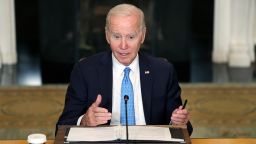It’s the October surprise Americans can’t afford.
A planned cut in production by Middle Eastern oil states, in defiance of White House pleas, is likely to further spike already rising gasoline prices.
More pain at the pump would be a major blow to Democrats weeks from the midterm elections and bring President Joe Biden’s boasts about getting the price per gallon down from record highs in June back to haunt him. And it could further hike the cost of living, a pivotal issue in the battle to control Congress on November 8. Longer term, higher inflation could cause the Federal Reserve to take even tougher action on raising interest rates, which could trigger a recession.
Soaring gasoline costs – a visceral indicator of economic pressure for millions of Americans – would offer Republicans a golden opening to dig deeper into their messaging about life being harder under Biden and potentially revive hopes of a red wave in November.
Ministers of the OPEC+ group meeting in Vienna on Wednesday agreed to a significant cut of 2 million barrels of crude production per day beginning in November – ignoring an extraordinary lobbying effort by the Biden administration, which one US official told CNN was akin to “having a spasm and panicking.”
The reaction in Washington underscored the potential political calamity the OPEC+ decision might create, with Democratic control of the House of Representatives and Senate hanging by a thread.
“I am concerned, it is unnecessary,” the President said on Wednesday. Two of Biden’s top aides, national security adviser Jake Sullivan and National Economic Council Director Brian Deese, described the decision as “shortsighted.” And White House press secretary Karine Jean-Pierre accused OPEC+ of “aligning with Russia” as President Vladimir Putin exploits higher oil prices to fund his brutal war in Ukraine.
High gasoline prices pummeled Americans in the early summer, culminating in a record average price per gallon of $5.016 in mid-June. But then prices fell for 98 days in a row, a period that coincided with revived Democratic hopes of holding onto their narrow congressional majorities, or at least avoiding a wipeout, as Biden’s job approval ratings ticked up slightly.
That streak ended in late September and the national average price for gasoline is now $3.831 per gallon, according to the American Automobile Association. Worryingly for Democrats, the cost of gas is already going up in some swing states that will decide the destiny of the Senate. In Nevada, the average cost is $5.536 a gallon, up 50 cents from a month ago. In Wisconsin, there’s been another 40-cent rise on last month. In two other battlegrounds, Pennsylvania and Georgia, prices as recorded by AAA have been falling over the last few weeks, but if they’ve bottomed out and climb again, they could have a political impact.
Gasoline prices are one of the factors that can influence elections that presidents have limited capacity to control. There are multiple reasons for higher prices, including the war in Ukraine, tightened demand in hurricane season, disruptions in the refinery business, untapped domestic resources and global economic factors. But nuance doesn’t sell on the campaign trail. Republicans are already slamming Biden with claims he’s solely to blame for elevated prices by limited domestic drilling – a charge that is debatable but sells well politically.
Republican Sen. John Barrasso of Wyoming on Wednesday pounced on the OPEC+ decision with a double barreled attack that branded Biden as hapless and his policies damaging to American consumers.
“@POTUS begged overseas dictators to increase oil production & they rejected him. Now Dems are scrambling to deal with an energy crisis their extreme policies helped create. The solution is simple — unleash American oil & natural gas production,” Barrasso wrote on Twitter.
Like the shock of skyrocketing bills for eggs, milk and meat, with which shoppers have struggled during a spate of high inflation, watching hard-earned wages be drained at gasoline pumps is a pain that affects struggling Americans the most but all Americans, directly or indirectly, eventually.
That’s why this is such a treacherous issue that can stir immediate political reverberations. At one point in the summer, it was not unusual to see stickers of the President on gas pumps bearing a variation of the words “Thanks Biden” or “I did that” with a picture of him pointing at the price of the fill-up.
How gas price rises could change the campaign
A fall gas price crisis could reshape the environment of midterm elections that historically are punishing for first-term presidents. Democrats had dared to hope in recent weeks that a combination of anger over the Supreme Court’s overturning of the nationwide right to an abortion, erratic GOP candidates elevated by ex-President Donald Trump and success in passing climate and health care legislation could keep Republican gains in check. But a renewed focus on inflation and gas prices, combined with attacks on immigration and violent crime, could erase some of that Democratic optimism.
A gas price crunch would be damaging for Biden because it would fuel perceptions that he is failing to properly manage the economy and undercut his assurances that after a long, grim trudge through the pandemic, better times area ahead. The White House already damaged its credibility on inflation, insisting multiple times over the last year that it was a temporary issue – even as the cost of grocery bills soared and the lived economic experience of many voters diverged from the more rosy descriptions of the economy coming from administration officials.
And attempts by Democrats to shake off the political liability of rising gas prices will be complicated by the triumphal statements Biden and his subordinates made around falling gas prices in July.
“Gas prices have been dropping for 34 days straight, about 50 cents a gallon. That saves the average driver about $25 a month,” Biden tweeted on July 18. “I know those extra dollars and cents mean something. It’s breathing room. And we’re not done working to get prices even lower.”
Another vulnerability for Biden lies in the spectacle surrounding a July trip he took to Saudi Arabia partly designed to convince the kingdom to pump more oil and lower gas prices. His pleas now appear to have been ignored. The fact that OPEC+ members are, as Jean-Pierre said, aligning with fellow member Russia adds to the damage. Any time US presidents look weak on the international stage, they offer an opening to domestic political opponents who will argue that they got played by the Saudis amid disrespect for the United States abroad.
John Kirby, the National Security Council coordinator for strategic communications, attempted to insulate the President from such charges on Wednesday. He denied in an interview on Fox that Biden’s trip – which represented a reversal of his campaign vow to make the kingdom a pariah over the killing and dismemberment of Washington Post journalist Jamal Khashoggi – was “a waste of time.”
Demands to punish the Saudis
The OPEC+ move is certain to lead to more calls for the US to punish the Saudis. Democratic Rep. Ro Khanna of California told CNN’s Matt Egan on Monday, for example, that the Saudis were “a third-rate power” and that Biden should cut off their access to aviation parts and prevent Raytheon and Boeing from doing business with the kingdom.
Worsening the already tense US relationship with Saudis might be politically satisfying but is unlikely to help Biden’s hopes of more production in future.
The President is likely to return to another favorite tactic – accusing US domestic oil companies of bilking drivers by piling up massive profits while refusing to ease the cost of gasoline.
“Energy companies are making record profits, with refiners and retailers also posting margins that are well above average — while passing the costs on to consumers,” Energy Secretary Jennifer Granholm said in a statement on September 30. “As the President has said, these companies need to focus less on taking every last dollar off the table, and more on passing through savings to their customers.”
The President will also likely have to resort to another previous tactic: slamming “Putin’s price hike” for the rise in the cost of living and prices at the pump.
Practically, there are few guaranteed moves Biden could take to lower prices. Sullivan and Deese said the President asked Granholm to explore options for increasing domestic production in the immediate term – in a possible signal to Wall Street and oil traders on international markets. And Biden could increase withdrawals from the Strategic Petroleum Reserve in order to increase global supply, but he’s already done.
Republicans, meanwhile, are likely to lean into their initial attacks lambasting Biden and his energy policies after having pivoting toward crime and immigration messages over the when the market had stabilized.
The attacks are emotive and difficult to defend against since they say what many Americans are already thinking, even if other indicators – like the unemployment rate, for example – paint a stronger picture of the economy.
In an advertising campaign earlier in the summer, Americans for Prosperity, a conservative advocacy group, spelled out a simple and effective message, featuring drivers at filling stations bemoaning the impact of high prices on their lives.
“I’m spending all my money on gas,” said one driver. Another added: “You shouldn’t have to choose between filling your gas tank and feeding your family.”
from "price" - Google News https://ift.tt/tfJN8Bn
via IFTTT



No comments:
Post a Comment